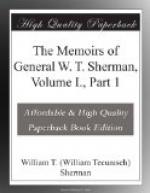Shortly after returning from Monterey, I was sent by General Smith up to Sacramento City to instruct Lieutenants Warner and Williamson, of the Engineers, to push their surveys of the Sierra Nevada Mountains, for the purpose of ascertaining the possibility of passing that range by a railroad, a subject that then elicited universal interest. It was generally assumed that such a road could not be made along any of the immigrant roads then in use, and Warner’s orders were to look farther north up the Feather River, or some one of its tributaries. Warner was engaged in this survey during the summer and fall of 1849, and had explored, to the very end of Goose Lake, the source of Feather River. Then, leaving Williamson with the baggage and part of the men, he took about ten men and a first-rate guide, crossed the summit to the east, and had turned south, having the range of mountains on his right hand, with the intention of regaining his camp by another pass in the mountain. The party was strung out, single file, with wide spaces between, Warner ahead. He had just crossed a small valley and ascended one of the spurs covered with sage-brush and rocks, when a band of Indians rose up and poured in a shower of arrows. The mule turned and ran back to the valley, where Warner fell off dead, punctured by five arrows. The mule also died. The guide, who was near to Warner, was mortally wounded; and one or two men had arrows in their bodies, but recovered. The party gathered about Warner’s body, in sight of the Indians, who whooped and yelled, but did not venture away from their cover of rocks. This party of men remained there all day without burying the bodies, and at night, by a wide circuit, passed the mountain, and reached Williamson’s camp. The news of Warner’s death cast a gloom over all the old Californians,




